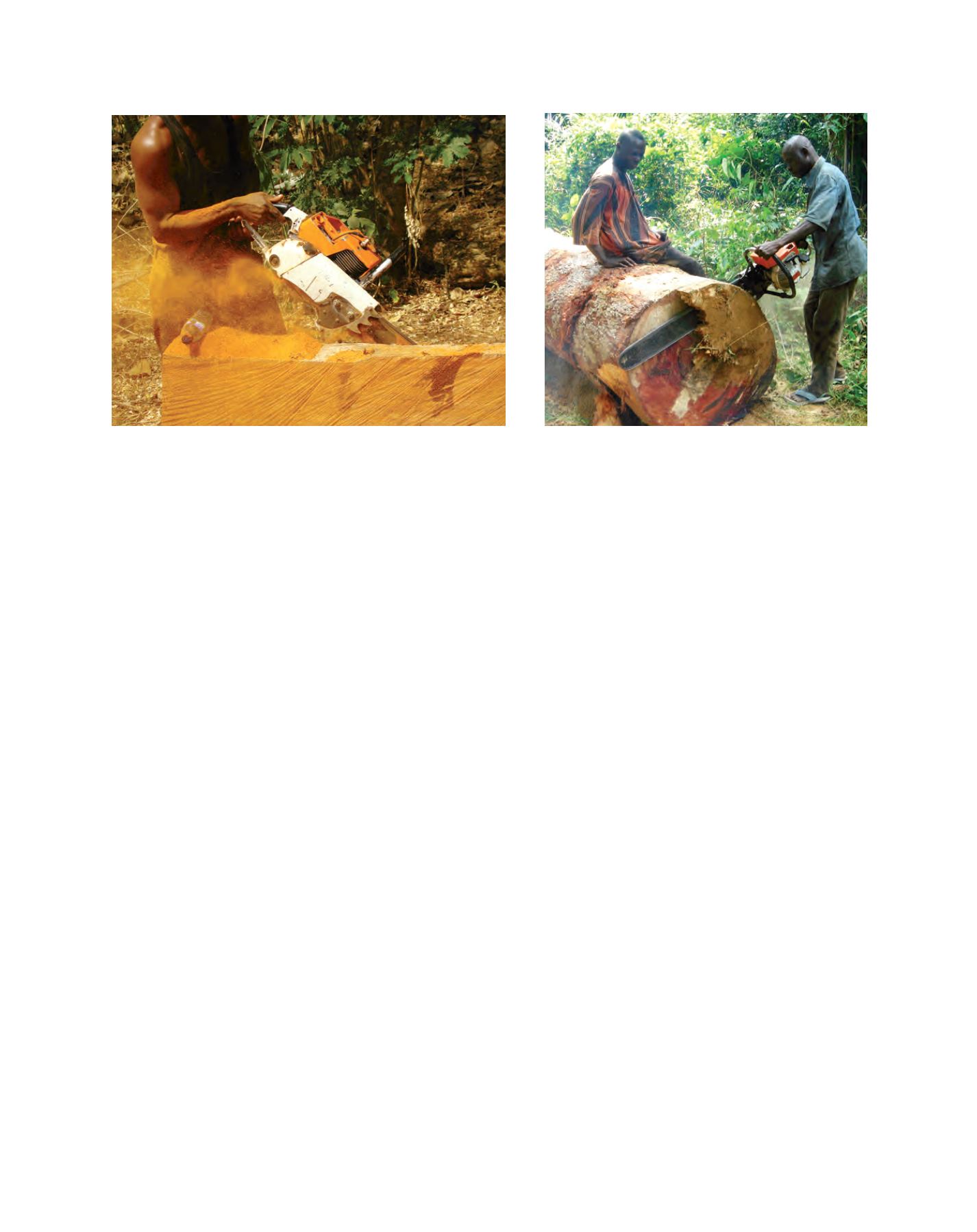

[
] 175
governance in Ghana. The lack of governance has been
identified as a major factor in enabling illegal chainsaw
milling, charcoal production and bush meat trade. The
current level of exploitation is more than four times the
actual increment, leading to a high rate of deforestation
and forest degradation. The VPA, financed through the
NREG budget support programme, with its focus on
legal timber trade, will help Ghana to improve its forest
governance and achieve sustainable forest management.
The challenge of including the local market
Although VPAs are primarily concerned with interna-
tional trade, Ghana decided to include in its VPA the
production of timber for the domestic market, 84 per
cent of which is supplied by illegal on-site chainsaw-
milled lumber. Although chainsaw milling (CSM) has
been banned since 1998, illegal CSM is flourishing with
an estimated annual harvest of 2.5 million m
3
. There
is a large official timber sector, but it is predominantly
export-oriented and unable to fulfil the demands of the
less lucrative domestic markets.
To reach consensus on the inclusion of the domestic
market in the VPA and the role of CSM, TBI has facili-
tated a process of multi-stakeholder dialogue (MSD)
in Ghana since 2007, involving both legal and illegal
actors. This process is aligned with the VPA implemen-
tation processes and has the active participation of FC
and FORIG.
Studies of the CSM sector carried out by the group
have established that it enjoys significant public support
in Ghana. Compared with legal lumber from the formal
industry, chainsawn lumber is cheaper to produce and
is more diverse in terms of species and dimensions. The
product chain includes the rural poor as well as the urban
elite. The practice provides a direct income to almost
100,000 people, who are mainly living in rural areas where
employment is scarce. It supports the livelihoods of at least
Sustainable Trade Initiative (IDH). More specifically, the timber chain
is supported in the context of FLEGT, which aims at facilitating trade
in legal timber and improving forest governance through initiatives
such as Voluntary Partnership Agreements (VPAs) between the EU
and timber exporting countries.
The Netherlands is supporting forest governance in Ghana through
sector budget support since 2008, together with the EU, World Bank,
DFID and France. An EU-funded chainsaw milling project which is
being carried out by Tropenbos International (TBI)
3
in collabora-
tion with the Forestry Research Institute of Ghana and the Forestry
Commission focused on the trade-offs between legalizing the timber
chain for EU export and promotion of local entrepreneurship for the
domestic market, to ensure local economic development in Ghana.
Changing forest landscapes in Ghana
Since the colonial era, the exploitation of timber for commercial
purposes has been an important part of the Ghanaian economy. But it is
only since the start of the Economic Recovery Program (ERP) under the
guidance of the World Bank and the IMF in 1981 that deforestation has
increased rapidly. The purpose of the ERP was to reduce Ghana’s debts
and to improve its trading position in the global economy. In practice,
it led to an annual rate of deforestation in Ghana of more than two per
cent, one of the highest in Africa, reducing Ghana’s rainforests by 90 per
cent in less than 50 years. The impact of deforestation is widespread,
affecting the livelihoods of local people and disrupting important envi-
ronmental functions of the original forest ecosystem.
Timber is Ghana’s third most important export commodity after
cocoa and minerals, but estimates suggest that 60-70 per cent of
logging has been illegal in recent years. The major buyers of Ghanaian
timber are countries in Europe and the FLEGT is enabling the EU to
address the problems posed by illegal logging. In November 2009,
Ghana was the first country to sign and ratify a VPA with the EU on
legal timber exports, including the domestic market.
Since 2008 the Netherlands, together with the EU, the World Bank,
the UK Department for International Development and France, has
provided sector budget support through Natural Resources and
Environmental Governance (NREG) to strengthen forest sector
Freehand chainsaw milling, which is not using more efficient equipment such as
frames for processing logs into lumber, is unhealthy and dangerous for operators
Image: Tropenbos International
A chainsaw operator crosscutting a log he just felled before
processing the log into lumber using the same chainsaw
Image: Tropenbos International
















